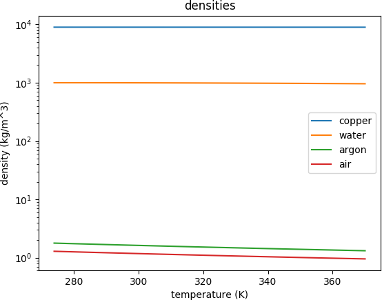materials
materials is a database of physical and chemical data, possibly with temperature dependence, of various more or less common materials. All data are given in SI units.
For example, to plot the density of various materials between 274 and 370 K you can do
import materials
import matplotlib.pyplot as plt
import numpy
T = numpy.linspace(274.0, 370.0, num=100)
rho_air = materials.air.density(T)
rho_argon = materials.argon.density(T)
rho_copper = materials.copper.density(T)
rho_water = materials.water.density(T)
plt.semilogy(T, rho_copper, label='copper')
plt.semilogy(T, rho_water, label='water')
plt.semilogy(T, rho_argon, label='argon')
plt.semilogy(T, rho_air, label='air')
plt.title('densities')
plt.xlabel('temperature (K)')
plt.ylabel('density (kg/m^3)')
plt.legend()
plt.show()Installation
materials is available from the Python Package Index, so simply type
pip install -U materials
to install or upgrade.
Testing
To run the materials unit tests, check out this repository and type
pytest
Distribution
To create a new release
-
bump the
__version__number, -
publish to PyPi and GitHub:
make publish
License
materials is published under the MIT license.


